Statement
Statement summary
UMARO SISSOCO EMBALÓ, President of Guinea-Bissau, said that the best response to the challenges confronting the international community includes strengthening multilateralism and international cooperation. “Multilateralism is an indispensable instrument and a moral imperative,” he emphasized, if such community wishes to build well—being for all. He underlined the need for coordinated action towards implementing the Sustainable Development Goals and the African Union’s Agenda 2063; ensuring development financing; and protecting the planet. To this end, States must comply with both the Paris Agreement on climate change and those accords reached during the 2022 United Nations Climate Change Conference — including the loss and damage fund for vulnerable countries such as Guinea-Bissau. Further, required changes must be made to the international peace-and-security architecture and to the global financial system to enable them to respond to the current international scenario.
Security Council reform, he went on to say, must consider the African Union’s position and ensure realistic and fair representation consistent with Africa’s “increasingly preponderant” role in building and maintaining balance in the world. Turning to his own country, he spotlighted the Government’s focus on dialogue, peacebuilding, political stability and socioeconomic development — in Guinea-Bissau, the West Africa subregion and beyond. He expressed concern, however, over the recurrence of coups d’état and “steps back in democracy and the rule of law in some countries in our subregion”, which flagrantly violate peoples’ freedom of choice as expressed through ballot boxes.
He then pointed out that, despite the harmful effects of the prolonged embargo imposed on the people of Cuba, that country has always supported — and continues to support — the countries of Africa. Reiterating an appeal for an end to this unjust, irrational measure, he said that it is “an obstacle to the fulfilment of the legitimate aspirations of the Cuban people”. The same is true for those in Venezuela, he emphasized, “whom we must also not forget and to whom we must show our solidarity”. Turning to African Governments’ prioritization of the struggle against malaria, he reported that — as a result of these efforts — more than 1.5 billion cases of malaria have been avoided and 10.5 million lives have been saved in Africa since 2000. He added that, if the world wishes to end malaria epidemics and achieve universal health coverage by 2030, “we must act now”.
Noting that his country is celebrating 50 years of independence, he recalled the United Nations historic visit to liberated regions, which confirmed “the existence of effective political, administrative and military control”. Further, he said that Guinea-Bissau’s people, on this occasion, will strengthen their “determination and energy to consolidate national unity and mobilize even more” to build peace and progress in their nation. He also reaffirmed the commitment of his country and its people to continue working with the United Nations and to cooperate with all friendly Governments and peoples towards world peace, global development and a protected planet.
Full statement
Read the full statement, in PDF format.
Photo

Previous sessions
Access the statements from previous sessions.
